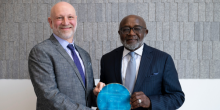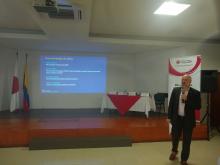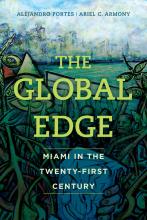Dear Colleagues,
For the past seven years, Ariel C. Armony has been a vital part of the Office of the Provost’s cabinet, joining first as Vice Provost for Global Affairs in August 2017 and continuing as Vice Chancellor for Global Affairs since July 2022. In these roles, and as director of the University Center for International Studies (UCIS), Ariel has worked passionately to advance the University of Pittsburgh’s global plan.
With sincere appreciation for all he has done to champion global engagement during his time at Pitt, I am writing to share that Ariel has been named Provost and Executive Vice President at Babson College, effective mid-fall of this year.
Ariel first came to Pitt in 2015 as senior director of international programs and director of UCIS. Since then, he has successfully established top-ranked area studies centers in UCIS; spearheaded the comprehensive Global Plan for Pitt; and overseen numerous initiatives to grow international partnerships and engagement, including the creation of the global advisory council, and to foster real-world impact through global learning and research.
He also sought out new ways to use technology to boost the student experience; established the Pitt Global Hub as an interactive resource to foster global citizenship, cultural awareness, and diverse communities; and centralized services for international students and scholars within UCIS.
As a result of these excellent efforts, under Ariel’s leadership, the University of Pittsburgh was selected as one of four institutions nationwide to receive NAFSA’s 2017 Senator Paul Simon Award for Comprehensive Internationalization, the highest honor bestowed by NAFSA: Association of International Educators.
Ariel has also actively promoted the development of academic credentials to help personalize a student’s educational experience; supported faculty research opportunities through the international and global studies centers; hosted visiting international scholars and postdoctoral fellows; and served on the Task Force on Reimagining Pitt Education.
Notably, in 2019, he worked to advance faculty diversity by implementing the Latinx Cluster Hire initiative to attract top candidates with Latinx expertise in research, teaching, and community engagement with diverse populations to expand and deepen the global community at Pitt.
He also has held faculty appointments in the Graduate School of Public and International Affairs and in the Department of Political Science at the Kenneth P. Dietrich School of Arts and Sciences.
Ariel has shared his scholarly expertise internationally in top journals, published multiple books, and served as a frequent commentator for U.S. and international media on topics ranging from the globalization of cities to innovation in international education. He was recognized as one of the U.S. “Top Argentine Professional and Business Leaders” by Negocios Magazine in 2017 and, in 2021, was named one of 25 fellows to the Hispanic Association of Colleges and Universities’ Leadership Academy/La Academia de Liderazgo.
Prior to his time at Pitt, Ariel led the University of Miami’s Institute for Advanced Study of the Americas. He has been a Fulbright scholar, Rockefeller Foundation scholar, and residential fellow at the Woodrow Wilson International Center for Scholars.
In the weeks ahead, we will identify an interim leader, and a search committee will be formed in the months ahead to identify his successor.
Over the last decade, Ariel’s leadership, drive, and dedication have truly shaped and elevated Pitt’s global character and status.
Please join me in warmly thanking and congratulating Ariel as he begins a new, exciting chapter at Babson College.
Best,
Joe
Joseph J. McCarthy
Provost and Senior Vice Chancellor
William Kepler Whiteford Professor of Chemical Engineering
University of Pittsburgh






